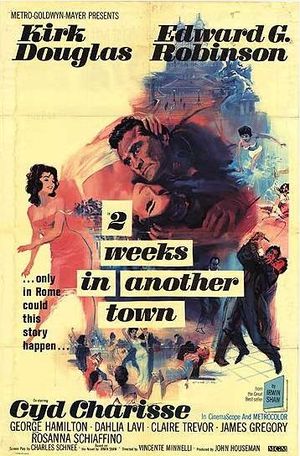
TWO WEEKS IN ANOTHER TOWN
US, 1962, 107 minutes, Colour.
Kirk Douglas, Edward G. Robinson, Cyd Charisse, Dahlia Lavi, George Hamilton, Claire Trevor, Rosanna Schiaffino, Jams Gregory, George Macready.
Directed by Vincente Minnelli.
Two Weeks In Another Town is a lurid film based on a best seller by Irwin Shaw. It is Hollywood looking at Hollywood - with a touch of the international cinema scene and Rome's Cinecitta. The screenplay was written by Charles Schnee, who wrote the Oscar-winning film The Bad And The Beautiful, also directed by Vincente Minnelli and starring Kirk Douglas. (This is the film that Douglas watches during the present film).
The film is filled with stereotypes, the lurid power struggles, collapse, fame, problems of the glamorous life of the film star. Kirk Douglas is at home in this kind of film and gives it some strength. It is not to be compared in quality with The Bad And The Beautiful. Edward G. Robinson has a strong role and Claire Trevor rants and raves with Cyd Charisse trying to look seductive and wealthy. George Hamilton is effective in an early role. The film is colourful, has very lavish and even garish colour and sequences. It is typical of the melodramas made by former musicals director Minnelli. Douglas worked for him in The Bad And The Beaxtiful and Lust For Life, other films of this time include Some Came Running, Home From The Hill, The Four Horsemen of the Apocalypse.
1. An entertaining melodrama? The value of films where Hollywood looks at itself? How adequately, justly? The hard look, cynical look? An optimistic ending? Hollywood and the '50s and '60s? The validity of the critique? Emphasising the Hollywood myths?
2. The work of Vincente Minnelli? His background in successful musicals? His range of vivid melodramas? What did he bring of these qualities to this film? The comparisons with The Had And The Beautiful? Its use in this film? Kirk Douglas in both film?
3. The use of Cinemascope, colour? The baroque and lurid and garish styles? The use of America to open, the transition to Rome? The world of Cinecitta? The Italian tone? The comparisons with Hollywood and showing studios all over the world being similar? The music, the score and its atmosphere?
4. Audience expectations of films about Hollywood? The popular myths from glossy magazines? The truth? The world of actors? and actresses, directors and producers? Glamour and business? Interpersonal relationships? Deals? Back-stabbing?
5. The universality of the themes, presented: breakdown.. ephemeral careers, self?importance, the testing of oneself? Power and manipulation of people? Big business?
6. Kirk Douglas' style as Jack? The opening of the film and his being in the home, his breakdown and the reasons given for it? His ability to cope? His reaction to the cable? His hopes in going to Row? The meeting of Lou at the airport and the cynical conversation? The relationship with Kruger? His hoping to prove himself?
7. The transition to Cinecitta? The elaborate detail of filming? The sequence with Davey and Barzelli? The audience being introduced to fantasy, the illusions of film-making? Kruger and his staff? The role of the producer. the director? Italian pressure on Kruger? His need for Jack? His manipulating,him? The dubbing issues and Jack helping? The importance of situating the melodrama within the realities of the plant, production?
8. The portrait of film-making: work, schedules, Italian actresses and their prima donna manner, the director playing up to the stars? The aura of glamour, money, pressures? Edward G. Robinson and his style as Kruger? Gossip columnists? Mental collapse? Financial takeover? Professional jealousies?
9. Jack and his crisis in Rome? His being used by Kruger., the hostility of Kruger's wife? His throwing himself into the job of dubbing? Being spurred on by his previous film (and the screening of The Bad And The Beautiful)? The importance of Carlotta's being in Rome? His marriage and the reasons for its break?up? Carlotta and her new marriage? Her wanting to exercise her power over Jack? The friendly encounter with Veronica and the low?key but genuine relationship? Davey as an image of Jack in his younger days? His temperamentalism, violent breakout, attack on Jack? Jack being able to rehabilitate him? The blend of work, emotion? Success? The build?up to the confrontation with Carlotta? The orgiastic night, the mad car drive and the crash? Jack proving that he could survive? His pushing Davey to independence? His return to the professional world and the possibility of a successful future?
10. The picture of women in the film: Carlotta and the stereotype of the selfcentred rich woman? The contrast with Veronica and her tenderness with Jack? The relationship with Davey and his violence towards her? Barzelli and her tantrum? Jack's long sequences in persuading her how to act, his slap on the face and her submission?
11. Kruger at work? His failure and the producers pushing him? The importance of his relationship with the women stars and his reputation? His marriages? Clara and her bitterness? His not listening to her during her tantrum? Her pressures, suicide threats? The big dinner and her speech? Her virulent attitude towards Jack?
12. Davey and the way he was presented as an image of Jack? His skill? People ridiculing him? Jealousy of Veronica? The tantrum and the violence? His career being saved by Jack? The final reconciliation?
13. The perennial popularity of this kind of glossy story? Best seller? The basic values that it explores ? how valuable when blended with melodramatic exploitation?